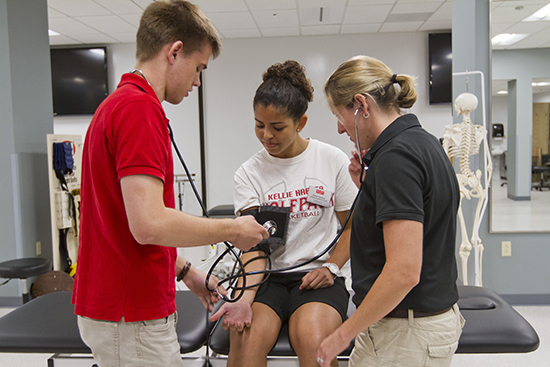
Sargent College is pumping up its program in athletic training starting in May, replacing the bachelor’s degree offering with one that leads to a master’s degree. The change will enable the school to meet a Commission on Accreditation of Athletic Training Education requirement that as of 2025 accredited programs offer a master’s instead of a bachelor’s as their entry-level degree. And in response to a recommendation (but not a requirement) by the American Occupational Therapy Association, the college this fall will start a doctoral program in occupational therapy (OT), replacing the current master’s program.
Christopher Moore, dean of SAR, says the changes will place BU graduates “well ahead of professional requirements in both fields for a number of years.”
“We’re among the early adopters,” he says. “But health care providers in all disciplines are tasked with increasingly broad scopes of practice and greater responsibility for patient outcomes. These increased levels of training reflect these advances in the clinical workplace.”
Moore says the changes will allow BU to continue competing for the best students in the two fields and better prepare them for the increasingly complex challenges facing providers in today’s health care environment.
“There are profound philosophical and professional changes in the baseline expectations of our graduates,” he says. “You’re seeing athletic trainers responsible for life-shaping decisions when you’re talking about making judgments about possible traumatic brain injury. And that’s just one small area of their scope of practice.”
Ellen Cohn (SAR’76,’00), a SAR clinical professor and director of the master’s and doctoral OT programs, says Sargent administrators “felt it is important for us to be at the forefront of preparing our profession’s future leaders.”
BU’s occupational therapy program is ranked second nationally by U.S. News & World Report, behind only the University of Southern California. While undergraduate athletic training programs are not ranked in the same way, BU’s has a high-caliber reputation. Over the last three years, 98 percent of its graduates have passed their certification exam on the first try, compared to the national average of 78 percent.
“We talked as a department…to say, how can we reinvent this program to capture all the benefits of graduate education,” says Sara Brown, a SAR clinical associate professor and director of the athletic training program.
Brown was one of the authors of the National Athletic Trainers’ Association white paper, published in December 2013, recommending the change.
The athletic training program will be primarily academic during the first year, with 12 to 15 hours a week of related clinical work. The second year will start with a seven-week full-time clinical experience, allowing the students to experience the busy season for athletic trainers at high schools and colleges. They’ll return to campus for a 6-week focused academic semester and have a 12-week full-time clinical experience in the second semester, with regular faculty contact.
One big advantage in moving the athletic training curriculum to a graduate degree is that it will bring in students from a variety of undergraduate interests. “The neat thing is that you could be an art major and just get the right prerequisite courses, which is a heavy dose of sciences mostly, and apply,” Brown says. “I’m excited to see what we pull in in terms of people’s backgrounds. I’m hopeful that we’ll get some older students, and international as well.”
She says the professional programs will no longer have to compete for undergraduates’ attention with other required courses, and the students won’t have to miss key undergraduate experiences—such as study abroad—because of the time commitment required by clinical education.
Occupational therapy is well positioned to make the shift, Cohn says, given that it already has the master’s degree program as well as a successful online postprofessional doctorate program. The new program will include 2 years of academic work on campus, summer online classes, 6 months of fieldwork, and a 16-week mentored practice experience focusing on advocacy, clinical practice, research, or education.
Current undergraduate enrollment in the athletic training program is 118, Brown says; the first year master’s cohort will be 10 students, with a target of 40 total. There are about 120 students enrolled in the occupational therapy master’s program, with a target of 90 in total for the doctoral program.
Applications for the occupational therapy program are already closed; applications for the athletic training program will be accepted until February 1. Students currently enrolled in the existing programs will finish their courses of study.
Brown says one thing that will not change is the commitment to excellence. “The students will be making decisions every day that affect peoples’ lives and health, and we want them to be as educated as they can be.”